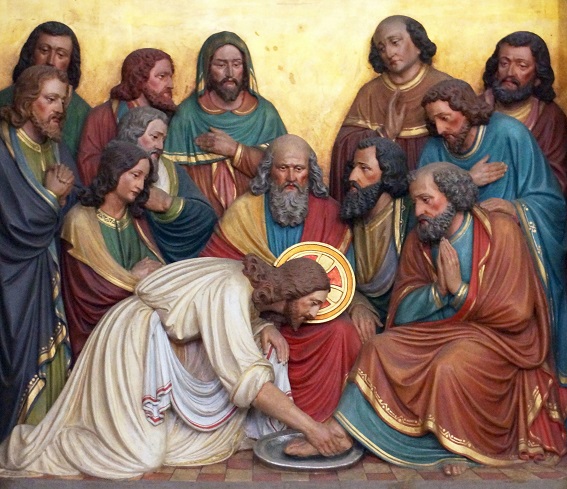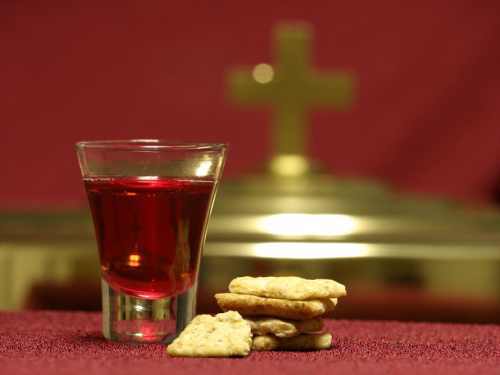Readings: Exodus 12:1-14 | 1 Corinthians 11:23-32 | John 13:1-15, 34-35
Text: Exodus 12:1-14; John 13:1-15 (34-35)
“The Nearness of God’s Redemption”
In the Passover, God provided salvation from death by the substitute of another. But this couldn’t be the fullness. No lamb could take the place of a person, for how had a lamb sinned and deserved a bloody death? The crude whole-roasted lamb, whose blood set the people free, ultimately could not our place.

At that time, the Lord was present among His people in the pillar of cloud by day and the pillar of fire by night. And even though He mighty acted on behalf of His people, He was still far removed from them, “For man shall not see me and live” (Ex. 33:20).
What mercy God showed in that he didn’t remain as far removed as a lamb is from a person!
The great love of God could not stay distant—God remembered His mercy, He saw our affliction, and God knew [Gen. 8:1; Ex. 2:25]. It moved Him to come near, even more so than seeing the cruelty of the Egyptians.
The Lord, who once delivered His people with a metaphorical “mighty hand and an outstretched arm” (Deut. 5:15) then did so concretely. To His people—suffering in the flesh and harassed by the devil, sin, and death—He came as Immanuel, God with us.
Behold this Lamb of God, by whom He saves not just the sons of Israel, but takes away the sins of the world. He came in our flesh to be condemned for our sin, to suffer our death. For He was not as far removed as a Lamb, but He became our brother, yet without sin. He was like us in every way, except sin (Heb. 2:17). Therefore allegorically, He is the true spotless Lamb whose blood shields us from destruction.

Unlike those bloody sacrificial lambs whose ashes were discarded outside the camp, Christ the Lamb of God has risen over death as its master. This is the Lord God who has joined Himself to us. He says, “I am with you always, even to the end of the age” (Matt. 28:20), and indeed that is truer than it was for His ancient people, Israel. His living Word is spoken in our congregation, His benediction is upon us and our children, His Baptism unites us with His death and resurrection, and—especially on this night—are we comforted and strengthened by His Body and Blood, broken and shed for us.
Here’s how Martin Chemnitz explained this heavenly and saving union:
“Our body is the body of death, but in that same body of ours which the Son of God assumed from us, death was again destroyed. Although our sins have separated us very far from God (Is. 59:2), so that we have been alienated from the grace, righteousness, and life of God (Eph. 2:12), yet the Son of God has brought very close to us those heavenly blessings which had been removed far from us (Eph. 2:13-19)…

Moreover, in His Holy Supper He joins Himself to us in that flesh, so that we may be strengthened by this most certain pledge of the salvation and glorification of our nature; for He does not blush to call us brothers. Therefore, because we are such, He also joins Himself to us in that flesh and blood (Heb. 2:14). Flesh brought death into this world and, again, the flesh of the Son of Man was given for the life of the world in order that he who eats the flesh of Christ may have eternal life. (John 6:54)” (Martin Chemnitz, Two Natures in Christ, pp. 55-56)
And that’s the whole picture of God’s deliverance. It’s not just about Him delivering us from adversity, but that He also dwells with us, giving us His peace, His strength, and His keeping with His mighty saving arm, and His hand once outstretched upon the cross for you and me. Take comfort in this meal because it is not just a symbol of a lamb, but the very Lamb of God who once was slain and now lives and reigns that we might live with Him.

At last this is how He gives us the command: “A new commandment I give to you, that you love one another: just as I have loved you, you also are to love one another. 35 By this all people will know that you are my disciples, if you have love for one another.” (John 13:34-35) For Israel it was the commandments and the statutes which set them apart, and the Lord who dwelt in the midst of the congregation. But in Christ we have more: We have the Living God, who has made us people for His own possession, living in us and doing His work in the world. He has washed us in the Red Sea of Baptism, making us die to sin and live before Him. To love one another as He has loved us is the result of His dwelling in our midst. Whenever we see a coldness or hard heart in ourselves or our brothers, it must be drowned and die in our Baptism. And living in God’s abundant mercy, people will know that we belong to Him, the Christ, the Son of the Living God.
In the Name + of Jesus. Amen.









